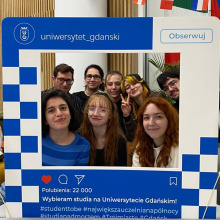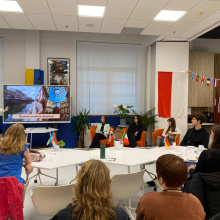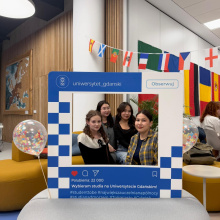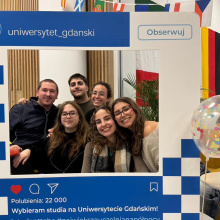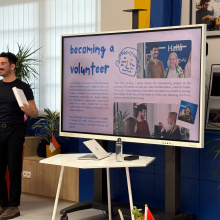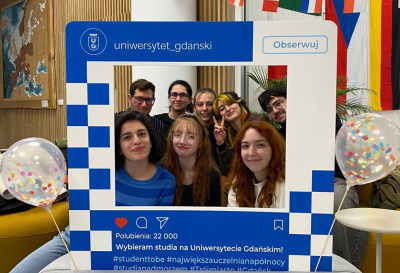
Over 200 people took part in the 9th edition of Erasmus Days, which took place on 13-18 October at the Welcome Centre of the University of Gdańsk. During the six days, European values such as inclusiveness and interculturalism were promoted. ‘Erasmus Days were a celebration of diversity. It is beautiful that although we all differ, we are in fact similar,’ said Monika Lengier, Erasmus+ programme coordinator.
Erasmus Days are a unique event dedicated to international mobility, culture, and integration, which is organised on the same date around the world. In 2024, more than 10,000 events took place in 60 countries, showcasing the wide range of the programme. This year, the focus was on the values of the European Union, and the slogan for this year's #ErasmusDays 2025 was: ‘Live our values, inspire our future’. ‘Values such as respect for human dignity, freedom, democracy, equality, the rule of law and human rights are shared by the societies of the EU countries, where inclusiveness, tolerance, justice, solidarity and non-discrimination prevail. Erasmus Days were a celebration of diversity. It is beautiful that although we all differ, we are in fact similar,’ said Monika Lengier, Erasmus+ programme coordinator.
From 13 to 18 October, the Welcome Centre at the University of Gdańsk celebrated the spirit of the Erasmus+ programme, highlighting the value that comes from cooperation and the acceptance of diversity. Participants could take part in the International Language Café, meet new people, practise their language skills, take part in the ‘Healthy Spine’ body workshop and learn practical tips and simple exercises to support good posture and well-being. During the bachata & salsa dance workshops, they could learn the basic steps and have a great time. During the Erasmus Information Day, information was presented on opportunities for travel under European programmes, recruitment rules, and financing. Łucja Gasik-Rachubińska from the Foundation for the Development of Systemic Education presented the Eurodesk programme, which enables youth exchange, and also talked about volunteering within the European Solidarity Corps. Dr Karolina Rudnicka and Marcel Jakubowski from SEA-EU talked about language tandems, i.e. language exchange and distance learning opportunities. Dr Agnieszka Kowalczyk, supervisor of the International Student Association, encouraged students to join the organisation, which focuses on integrating students coming to the University of Gdańsk under the Erasmus+ programme.
A journey that has come full circle
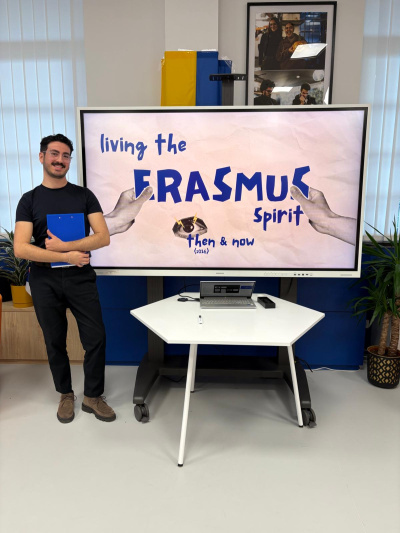
Berkay Altunbaş from Turkey, who has been working as a volunteer at the Cooperation and International Relations Office at the University of Gdańsk since April as part of the European Solidarity Corps, talked about how he himself spoke of ‘living in the spirit of the Erasmus programme’ and how his journey had come full circle, as he returned to Gdańsk after nine years. In 2016, he came on a student exchange to WSB Merito University in Gdańsk, and a year later, he obtained a bachelor's degree in international relations in Turkey. Since then, he has worked at two different universities in Turkey for over seven years, helping hundreds of students and staff to study or train abroad.
‘Throughout all these years, my main motivation has always been the same: to promote the Erasmus+ programme and show that it can change lives, just as it changed mine,’ he said during the presentation.
Berkay recalled that when his application for a student exchange was accepted nine years ago, he hesitated to take advantage of the opportunity to go abroad: "Even though I was studying in English, I was worried about whether I would be able to express myself, make friends or simply fit in. However, over time, I realised that communication is not about perfect grammar, but about openness and a willingness to learn from others.
He says that this experience completely changed his outlook on life: ‘I became more independent, more confident and more curious about other cultures. Looking back, I can say that it all started with one simple feeling - curiosity.’
Now that he is back in Gdańsk, the city where his Erasmus adventure began, he says: ‘Volunteering in Gdańsk felt like destiny. It's like coming home. Now I'm stepping out of my comfort zone to do new things in a city that is no longer new to me.’
The European Solidarity Corps (ESC), funded by the European Union, offers young people aged 18 to 30 the opportunity to volunteer across Europe. ‘It's a great alternative for adults who have finished school and don't yet know what they want to do in life, because the programme offers young people the chance to gain professional experience, learn foreign languages and get to know other cultures. This allows ECS participants to discover the direction in which they want to develop,’ says Monika Lengier.
‘Erasmus+ is more than just a programme for me. It is a journey during which I went from being a curious student to a professional helping others, and now a volunteer who gives back what he has received. This journey has taught me that every ending is also a new beginning. And sometimes life really does come full circle,’ says the volunteer.
A change of perspective
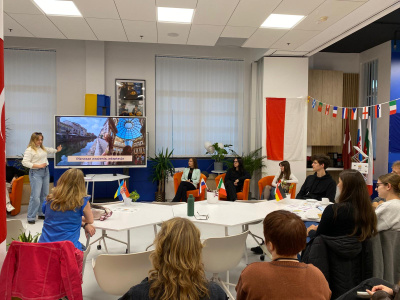
The Erasmus+ programme enables students to study at partner universities in European countries. The first mobility can take place after completing the first year of studies, i.e. in the third semester. You can choose between one semester or the entire academic year. If you originally chose to go for one semester, you can extend it for another.
Marta has a bachelor's degree in business psychology and is currently in her first year of a master's degree in early childhood education. She came to the Erasmus Information Day meeting and is listening to the presentations: ‘My friends have already taken advantage of Erasmus, and I was a little afraid of the challenge. But now that I've started my next degree, the desire to travel and learn about other cultures has returned. I'm thinking about it more seriously.’
Three years ago, Kaja spent six months in Finland. At the time, she was a student of Scandinavian studies (she chose Finnish), spoke Finnish and wanted to improve her language skills. ‘Thanks to my six-month stay in Finland, I now speak Finnish fluently. I was able to see for myself that this language functions completely differently than in books and textbooks. In addition, this trip allowed me to place linguistic contexts in cultural realities, which completely changes your perspective and makes you understand the language you use better,’ she reports.
After obtaining her bachelor's degree, Kaja decided to pursue a master's degree in management and also decided to take advantage of the Erasmus+ programme at this stage of her education: ‘I wanted to add hard skills to my language skills that I could use in my work in a corporation, hence the decision to study management. In my second year of my master's degree, I went to Milan, the capital not only of design and fashion, but also of business. I wanted to gain not only theoretical knowledge, but also practical experience. And I was not disappointed, because I had the opportunity to take part in various events organised by large corporations. I was also able to see how people work in an international environment. Of course, one cannot forget about the cultural context. There were Italian students at my university, and I also had contact with students from all over the world. We had to communicate despite the sometimes significant cultural differences and different approaches to work. It was a very enriching experience,’ she assures us.
Erasmus+ is more than studying
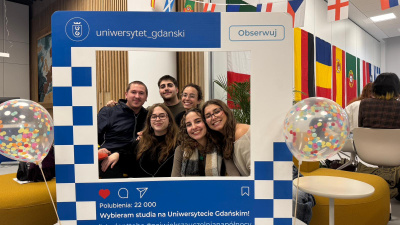
The Erasmus+ programme also offers the opportunity to go on an internship abroad. ‘This initiative allowed me to go to Spain eight years ago, right after completing my bachelor's degree, and after my master's degree six years ago, I went on another internship in Italy. After returning, I defended my doctoral thesis at the Faculty of Chemistry and received a job offer at the University of Gdańsk,’ recalls dr Agnieszka Kowalczyk, who has linked her career path with the University of Gdańsk. The scientist lectures at the Faculty of Chemistry and is still committed to the idea of international cooperation. She is the supervisor of the International Student Association and is also involved in initiatives promoting intercultural exchange, conducting bachata & salsa dance workshops, spreading her passion and showing that dance is an international language.
‘Thanks to Erasmus, I gained a fantastic experience. I got to know new cultures and made friends for life. I improved not only my English, but also my Italian and Spanish. I've come a long way, but I'm very grateful for this opportunity,’ emphasises dr Agnieszka Kowalczyk.
Erasmus+ is not only about studying, but also about friendships, new perspectives and unforgettable memories. It is a step towards an international career and personal development.
‘During Erasmus Days, we wanted to show the opportunities that young people can take advantage of. It is not an empty slogan that Erasmus+ opens minds and changes lives. People really do change and open up. Some academically, others privately. Last year, one of the participants in the discussion panel said that he found his wife in Spain during his Erasmus stay. As you can see, Erasmus changes lives,’ concludes Monika Lengier, programme coordinator.

